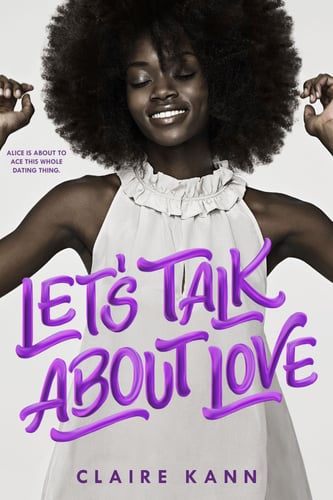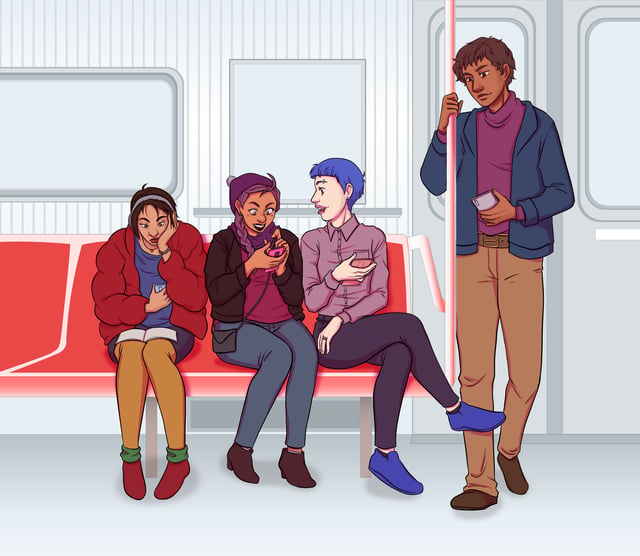So, this book... I have a mess of thoughts on it. And I have a lot of content warnings, and if you too are on the asexuality spectrum and want to read this book, my content warnings for you are at the bottom. There’s a lot to take in and process.
But here’s a TLDR review: LET’S TALK ABOUT LOVE presents an asexual heroine trying to understand herself while her friends are terrible, and the book barely examines that fact. It promotes a harmful infantilizing stereotype, but also has some lovely and insightful moments with her love interest.
Here’s the longer review:
To start at the beginning, LET’S TALK ABOUT LOVE is a book about a biromantic asexual woman (Alice) discovering what romantic attraction feels like for her. It’s also a story about friends and the messiness of those relationships, especially when you are no longer a kid, but only sort of feel like an adult. This is a new adult story in that frustrating 19-year-old way.
If you’re allosexual and you’ve ever wondered what someone who is a-spec (and alloromantic) fears when it comes to a romantic relationship, the book opens there. Alice is immediately dumped by her girlfriend and roommate because Alice does not want to engage in sex the way Margot, the girlfriend, wants. Margot says every possible hurtful thing she can by essentially asking if Alice is broken and needs to be fixed. It’s a gut punch. Almost every insecurity and expectation of not being believed or understood by a romantic partner is written in those pages, which makes it feel more like a primer for an allosexual reader than something for an asexual reader.
However, there’s more. The book presents Alice’s friends Feenie and Ryan as great friends, but I’d argue that they aren’t. Ryan is sort of blank probably to make room for the volatile Feenie. And the books tells us repeatedly how great Feenie is, how she’s Alice’s soulmate, and so on, but I read a very toxic friendship. While Feenie supported Alice in high school against bullies and is one of two people who know that Alice is asexual, she’s remarkably self-absorbed to borderline cruel. The book turned against me the moment Feenie announced that she had a plan for Alice that included sex. Hold that thought.
So, shortly after being dumped, Alice meets Takumi at work and has a very intense reaction to him. She’s immediately confused because these feelings are different and strong and scary. Takumi likes Alice because she’s cute, but Alice is only ever rude to him at this point because she cannot process her reaction to him. And so she tells Feenie, who says:
“I’ve been waiting for this. I have a plan and it needs sharing... I think this is going to provide a perfect opportunity... To sleep with him, of course. You need to have sex with him.”
Dear reader, I read that a week ago and I’m still furious. Alice is frustrated by this, lets her friend say “maybe you’re graysexual,” and then allows the overbearing and controlling Feenie to present her plan. Friends having ideas are fine, friends defining what Alice needs to do are not fine. Friends trying to fix their asexual friends are the worst. And the “wisdom” of Feenie is never challenged. She is as clueless and hurtful as everyone else.
And let’s pause for a moment to discuss the depiction of Alice. In short, almost everything about Alice feels infantilized, but I was a teenage girl once and the world tells us to act cuter and more innocent than we feel. So how much is really Alice and how much is society? It’s so hard to criticize here because for everything I say, there’s the side argument “but she’s nineteen.” So, is this accurate for a college freshman? Maybe. My bigger issue is that the allosexual world tends to view a-spec folks as innocent and sheltered and in need of protection from the mean, sexy world. And the thing is, we aren’t that (we know how to navigate the default allosexual world because we can’t escape it). Innocent, sweet, and cute Alice just promotes the stereotype of the childlike asexual, but she’s nineteen.
Surprisingly, I don’t have a lot of complaints about Takumi.* He’s kind and generous and patient. He never pushes Alice for more, never demands what her previous boyfriend and girlfriend did. They are good friends to each other. And the moment Alice finally tells Takumi that she’s asexual and loves him, he reacts gently, but with caution. Some might argue that Takumi is terrible for not saying “I love you no matter what” immediately, but I appreciated his pause. Consideration is in the pause. (There’s an HFN, don’t worry.)
Back to the “friends.” For reasons that the text and Alice never really challenge, Feenie becomes jealous of the friendship between Alice and Takumi. Communication between Alice and Feenie shuts down until there is a major fight. All of this is reasonable with the “but she’s nineteen” argument, except the book pretends that all of those issues and jealousies are resolved when only the grievances have been aired. There are so many instances of Alice’s friends being bad friends that my sincere hope is that she finds better friends after the book.
So, yeah. I’m not going to say that the asexuality representation was handled well, but it wasn’t the worst I’ve seen. The beginning was so rough that I believed it would only get worse. And now that I’m at the end of this review, I realize that there isn’t much plot to LET’S TALK ABOUT LOVE, which isn’t a complaint, but is a note.
* This book was part of a sort of crowdsourced competition, so there are reviews on Goodreads that reflect an earlier and much more problematic book. The published book has corrected a lot of the issues with Takumi. There was a moment when I wondered if he was grooming her in a creepy way, but that went away.
CONTENT WARNINGs: aphobia, asexuality erasure, manipulative friends, controlling family, coming out, racism from minor characters, sexual harassment
If you are on the asexuality spectrum, here’s what I want you to know before you read this book:
- Immediately, Alice’s very soon-to-be ex-girlfriend breaks up with her because Alice doesn’t want to have sex. An important detail is that Alice does have sex with her girlfriend, but Alice does not want Margot to reciprocate. And it is clear that Alice would rather not be doing this, but does it because she loves her girlfriend.
- Then, we face the various problem questions. Were you abused? Have you seen a doctor? Are you saving yourself? And that rolls straight into aphobia with the ex-girlfriend declaring it impossible that Alice could love Margot as much as Margot loves Alice because Alice doesn’t want an orgasm from Margot’s hands.
- We learn that Alice has had sex with people in an attempt to fit in and feel “normal.” And guess what? She hated it. Also, her douche high school boyfriend gave her the nickname The Corpse.
- When Alice meets Takumi, she experiences a strong attraction and freaks out. Her best friend, Feenie, decides that on this occasion she needs to help Alice and insists that Alice have sex with Takumi because maybe it was just bad sex with the wrong people before. And UGH. Feenie starts what she calls the Takumi Trials to help Alice figure out if it’s sexual or romantic attraction. Save us from these friends.
- Alice visits a counselor, who seems to be good at his job when it comes to asexuality, but he can sometimes seem like the “let’s teach allosexuals about asexuals” lecture we get in these sorts of books. Except Alice somehow believes that Feenie is more help than the counselor.
- Takumi takes time to process Alice coming out as asexual to him. He doesn’t react favorably at the time, but he doesn’t say anything hurtful.


